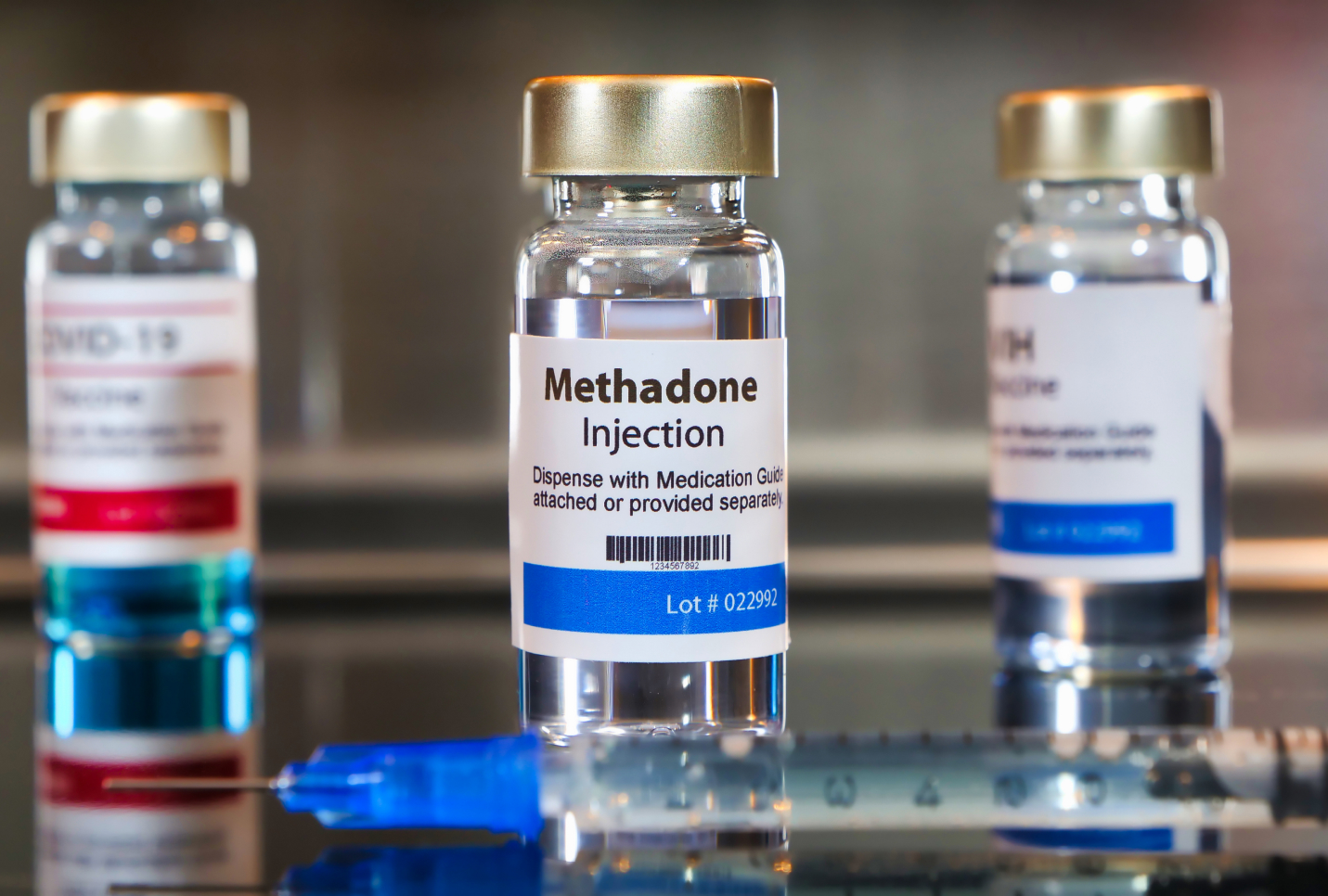Methadone is a drug that can be prescribed by a doctor or used illicitly off the streets. How you obtain methadone and why you use it can vary drastically, but when taken under medical supervision, it can have a lot of benefits.
There is a risk of becoming dependent on methadone, so you must be careful about how much you take and how often. If problems arise with your or a loved one’s methadone use, seek a professional treatment program.
Methadone is somewhat of a double-edged sword — while it can be beneficial for people with opioid use disorder to use it, the short- and long-term side effects can be damaging. To learn more about what methadone is and its side effects, continue reading.
What Is Methadone?
Methadone is described as a synthetic, narcotic analgesic drug that works to help relieve chronic pain. It’s a prescription painkiller that can be given out to those that experience moderate to severe pain.
While it can be prescribed to people, it has a risk of becoming addictive, so it may not be the first painkiller to be prescribed to someone. When a person has a history of substance abuse, with opiates or benzodiazepines, methadone might not be the best thing to give them.
On the other hand, methadone is often used to help people struggling with addiction to opioids wean themselves off their drug abuse. Similar to buprenorphine, methadone maintenance treatment is usually monitored by a medical healthcare provider because there is still a risk of becoming dependent on methadone, even though it can really help with opioid withdrawal symptoms.
How Does It Work?
Methadone works to change the way your brain, body, and nervous system react to pain. It can bring you a sense of pain relief while in your system, so it can be helpful for those that have undergone surgery, are experiencing chronic or acute pain, or suffer from a long-term illness.
Methadone that is prescribed will be given to a patient in an oral form, such as a tablet, powder, or liquid. It is important to stick to the exact dose of methadone (methadose) and timeline when taking methadone to lower the risk of becoming dependent on having it in your system.
What Is It Used For?
Methadone is used as a pain reliever when it’s being prescribed, but it has another purpose that is useful for those struggling with addiction. Methadone is often given to people struggling with opioid use disorder because it works to block the high that opioids like heroin, codeine, hydrocodone, morphine, and oxycodone. People trying to come off of opioids are strongly advised not to do it cold turkey but to wean themselves off it.
While methadone will still produce a high in the body, it is not as strong as other opioids. This means it can limit the chance of overdose, withdrawal symptoms, or intense cravings as you replace your opioid use with methadone.
This is often called “replacement therapy,” but it is not the end of the addiction journey. You still need to seek therapy and professional addiction treatment to see the results you want.
History of Methadone
Methadone was first used by German medics during World War II when morphine was becoming hard to get ahold of. Methadone was created by two German scientists, Max Bockmühl and Gustav Ehrhart, and was seen as less addicting than morphine.
Eventually, its use crossed over to the Allied forces, and a few years later, it was made available to the people of the United States. In the late 1940s, it was marketed as an all-purpose pain medication, but three decades later, it was approved by the FDA to treat opioid addiction and narcotic abuse.
Now, doctors can prescribe methadone for pain and as a way to help opioid users through their recovery journey.
Side Effects of Methadone
The side effects of methadone have a great range, and everyone has their own response to it. While it can be extremely helpful and useful to those in recovery, it’s important not to forget that it’s still a narcotic and has the risk of being abused. Even when a person uses methadone under their doctor’s orders, it can cause negative side effects.
Some of the mild side effects that you might experience when using higher doses of methadone are:
- Dry mouth
- Lightheadedness
- Lowered blood pressure
- Gastrointestinal issues
- Urinary retention
- Constipation
- Sexual impotence
- Drowsiness
- Headaches
- Weight gain
- Sore tongue
- Skin flushing
Some more serious side effects that you might experience during short-term use are:
- Irregular heartbeat
- Tremors
- Fainting
- Seizures
- Chest pain
- Allergic reactions
- Depressed respiratory function
- Tremors
- Death as a result of an overdose
Risk of Long-Term Use of Methadone
Methadone use is not meant to be used indefinitely. For some, it might take a little longer to wean themselves off of opioids, and methadone is there to help. However, long-term use of methadone can produce various negative side effects that will need intervention of their own.
It’s important that if you think someone is misusing their methadone, reach out and offer your support. It can be difficult to admit that you’re struggling, especially when the purpose of the medication is to help overcome your opioid addiction.
Addiction
When people are prescribed methadone for their pain, there is a risk that they can become chemically dependent on having it in their system. Addiction can happen to anyone, so if not monitored properly, you might be at a higher risk.
When methadone is taken improperly, like by snorting a powdered version of it, it can result in a high similar to that of an opioid use high. When misused in this way, addiction is more likely to occur. Methadone use alters your brain, similarly to how other opioids can change your brain and how it functions.
Psychological Effects
Methadone can directly impact your mental health, increasing the likelihood of experiencing psychological effects. People can suffer from hallucinations and delusions, making it more difficult to distinguish what is real.
As a result, people using methadone might become more paranoid and suffer from sleep disorders or suicidal ideations. It can create more anxiety and put you into a place of depression, which is why going through other forms of therapy during your methadone use can be helpful.
While methadone is a medication that can help, going through talk therapy or group therapy sessions works on a different part of your problem.
Health Impacts
Long-term use of methadone can impair your liver, kidney, nerves, and brain, with more research being done to learn more about side effects. When lab rats were tested with methadone, it was found that the rats had lower attention spans than previously. This implication might mean there is a chance of impaired concentration after prolonged methadone use.
Overdose
If people using methadone begin to change their doses on their own or take it more frequently, they are putting themselves at risk of an overdose. Even trying to quit cold turkey might send your body into shock, causing you to crave more than usual.
The signs that someone using methadone might be experiencing an overdose are:
- Breathing problems: shallow breathing or trouble breathing deeply
- A slower heart rate
- Respiratory depression
- Cold, clammy skin
- Fainting
- Weak muscles
- Small pupils
- Drowsiness
- Inability to communicate
An overdose of methadone can be fatal and will need intervention to happen immediately.
Seeking Treatment With Soba Recovery
Treating methadone addiction is similar to treating every other drug addiction here at Soba Recovery Center in San Antonio, Texas. We believe that addiction can not be treated without treating each patient as the individual that they are. When you call today, you can schedule an initial consultation that helps the staff here better understand your needs.
Everyone goes through addiction differently, so we create customized treatment plans that put your needs first. Then we can determine treatment options to move you toward success and recovery.
Whether you start inpatient and move to outpatient or start with outpatient to enter into sober living quarters, we will help you make the best decisions.
Call us to talk with a Soba representative about how we can help you through your addiction. You can start your journey toward sobriety and recovery as soon as today!
Sources:
Methadone – StatPearls | NCBI Bookshelf
Disposition Of Nasal, Intravenous, And Oral Methadone In Healthy Volunteers | NCBI
The Neurobiology of Opioid Dependence: Implications for Treatment | NCBI
Possible Harmful Effects From Prolonged Use Of Methadone | Medical News Today





